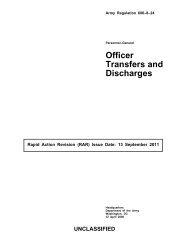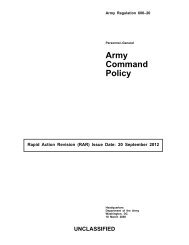Patient Administration - Army Publishing Directorate - U.S. Army
Patient Administration - Army Publishing Directorate - U.S. Army
Patient Administration - Army Publishing Directorate - U.S. Army
You also want an ePaper? Increase the reach of your titles
YUMPU automatically turns print PDFs into web optimized ePapers that Google loves.
. The approving authority may delegate authority to review and act on MEBs. The individual to whom this<br />
authority is delegated (for example, DCCS) must not participate in the board proceedings either as a member, witness,<br />
consultant, or in any other capacity.<br />
7–14. Distribution of medical evaluation board proceedings<br />
Distribution of board proceedings will be as indicated in table 7-1. Distribution will depend on the disposition of the<br />
patient and on conditions further prescribed for RC and ROTC personnel in paragraph 5-9, for prisoner patients in<br />
paragraph 5-13, and for certain military personnel requiring further hospitalization upon separation in paragraph 5-18.<br />
Additional copies prepared for mentally incompetent patients will be forwarded directly to U.S. <strong>Army</strong> Finance and<br />
Accounting Center, ATTN: DFAS-IN-FJEC-B Settlement Operations, Indianapolis, IN 46249-0845.<br />
7–15. Interservice cooperation in medical evaluation board actions<br />
a. MEB proceedings of one Uniformed Service are acceptable to another Uniformed Service and may serve as a<br />
basis for further medical or administrative action by that Service.<br />
b. Soldiers who are hospitalized or receiving treatment in MTFs of another Uniformed Service capable of providing<br />
the required medical care will not be transferred to an MTF of his or her parent Service merely to fulfill an MEB<br />
convening requirement. The MEB will be convened at the MTF where the patient is hospitalized and the report of<br />
proceedings will be forwarded to the reviewing authority of the Soldier’s Service for appropriate action.<br />
c. Soldiers who require aeromedical evacuation to another MTF and who are not expected to return to duty will be<br />
regulated and moved to the MTF nearest the member’s home which is capable of providing the required care and<br />
disposition. The losing MTF will immediately notify the MTF with geographical responsibility for the Soldier. This is<br />
normally done without regard to the member’s Service affiliation. However, patients in the categories in (1) through (3)<br />
below will be evacuated to a hospital of the parent Service.<br />
(1) Those who are undergoing dual processing such as medical disability and administrative separation or courtsmartial<br />
proceedings.<br />
(2) Those who require special psychiatric examinations to determine competency to receive pay.<br />
(3) Service academy cadets.<br />
7–16. Triservice medical evaluation board coordination<br />
a. To ensure that administrative control is maintained for Air Force, Navy, and Marine Corps members hospitalized<br />
in <strong>Army</strong> hospitals, personnel of the admitting (<strong>Army</strong>) hospital will immediately notify the closest Navy or Air Force<br />
hospital. It is the responsibility of the Navy or Air Force hospital to assume administrative control of their patients. For<br />
example, when an Air Force member is hospitalized at Darnall <strong>Army</strong> Community Hospital, Fort Hood, personnel at<br />
Darnall should immediately notify Wilford Hall Medical Center.<br />
b. MEB proceedings completed by another Uniformed Service may include recommendations regarding the member’s<br />
disposition. However, “referral of the proceedings to the Service reviewing authority” is the only official<br />
disposition that can be used. This is required since Service physical standards vary and could result in different<br />
dispositions. Also, one Uniformed Service will not commit another Uniformed Service to a specific disposition.<br />
c. The member’s Service may request another MTF where the member is hospitalized to initiate proceedings. While<br />
such requests are not binding or mandatory, every effort will be made to honor them.<br />
d. The PEBs of all Uniformed Services are authorized to communicate directly with the hospital that convened the<br />
MEB when additional or clarifying information is needed.<br />
e. If difficulties arise between two MTFs which cannot be resolved at that level, assistance should be requested<br />
through Service headquarters channels.<br />
f. Questions concerning another Service’s medical standards will be referred to the appropriate Service reviewing<br />
authority.<br />
7–17. Options available to the Service reviewing authority<br />
If an MEB prepared by another Service is forwarded to the member’s Service reviewing authority, the reviewing<br />
authority may—<br />
a. Accept the board proceedings and process according to Service directives.<br />
b. Return the proceedings to the MEB appointing authority for further information or clarification.<br />
c. Reject the board proceedings and direct the transfer of the member to a hospital of his or her parent Service for<br />
further evaluation if it is deemed to be in the best interest of the patient and the Service concerned.<br />
7–18. Counseling members concerning medical board results<br />
a. Upon completion of the MEB and approval of the proceedings, the member will be counseled concerning the<br />
findings. If the member disagrees with the board, the member has 3 working days to prepare a written appeal for<br />
submission to the appointing authority. If no action is taken by the member within 3 working days, the board results<br />
will be forwarded, as if approved by the member, to the Service reviewing authority for further action.<br />
60 AR 40–400 27 January 2010
















